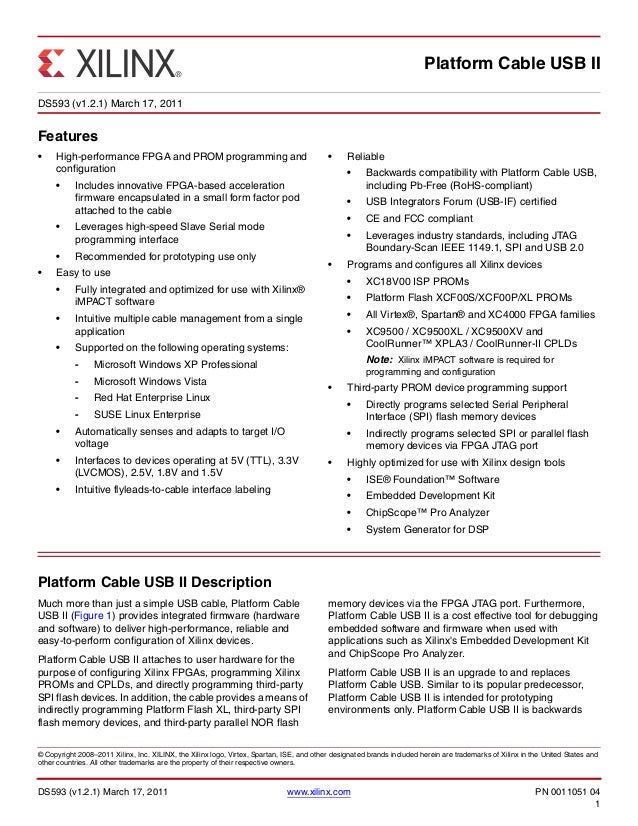
Dlc9g Platform Cable Usb Driver
So, I bought the DLC9G programmer plugged it into the USB port. I di not install any drivers, since the cable drivers were installed during the ISE WebPACK.
I just started working with FPGAs/CPLDs. Coding and simulation went well and now I wish to program a device.
So, I bought the programmer plugged it into the USB port. I di not install any drivers, since the cable drivers were installed during the ISE WebPACK installation process. The message popped up: So, I clicked on it for detailed information: I went to the Device Manager and right-clicked one the Unknown device to update the driver.
I manually pointed out the path suggested by @Tut in his comment, but it said that the driver was up-to-date (hopefully that was said about the driver for the cable). I decided to take a different route and followed the guide for device configuration. For my Win7 x64 and ISE 14.7 WEBAPCK I downloaded a dirver stated on p.15, Step 5.2 of the guide. After extracting the files and running the install_xusb.bat as administrator, I got the following message from the console window 'cannot run x86 build of this utility on x64 platform': Any one has an idea if this is a defective device, or it's because of the driver issues?
What's the problem with the driver installation? Should this device be at least recognized as programming cable/xilinx product if no driver is present? It's funny you should ask this. I just managed to successfully install the DLC9G driver for ISE 14.7 Webpack just two days ago onto a Windows 7 Professional 64 bit computer (a painful experience). There were a couple things I needed to do in order to install the driver: • Despite administrator privileges and performing all installs using 'Run as administrator', I kept getting driver installation failures which included an 'Access is denied' message. I finally found. Scenario 2 provided the help I needed.
This required going to 'User Account Control' and setting it to 'Never notify' and then rebooting. • The next thing that needed to be done was to manually install the driver. First I went to Device Manager. I then plugged in the DLC9G and noticed the exclamation point over (I believe) 'unknown device' (or something similar) located in 'Programming cables'. At this point, I thought it would be a good idea to right-click over 'unknown device' and select 'Uninstall'.

Next I right-clicked over 'unknown device' and selected 'Update Driver Software.' Next I selected 'Browse my computer for driver software'. Next I chose 'Browse.' And pathed to C: Xilinx 14.7 ISE_DS common bin nt64.
I also had 'Include subfolders' checked. Clicking on 'Next' installed the driver and my DLC9G was working! The driver I used came with ISE 14.7 Webpack. The path I used above was the path for the default installation.
I did not use the User guide (ug344) or the drivers indicated in that guide. Item 1 above (the fix for the 'Access is denied' error) also fixed a problem I was having installing drivers for the Microchip ICD3. Creative element power tools download. After correct installation, Device Manager indicated 'Xilinx USB Cable' under 'Programming Cables'. It also indicated 'WinDriver' under 'Jungo' which previously also indicated 'unknown device' (or something similar).
XILINX USB/Parallel JTAG cables on Linux without windrvr XILINX JTAG tools on Linux without proprietary kernel modules About When using XILINX JTAG software like Impact, Chipscope and XMD on Linux, the proprietary kernel module windrvr from Jungo is needed to access the parallel- or usb-cable. As this module does not work with current linux kernel versions ( & gt; 2.6.18) a library was developed, which emulates the module in userspace and allows the tools to access the JTAG cable without the need for a proprietary kernel module.
The library uses libusb to access USB devices and the ppdev interface to communicate with parallel cables. The parallel part currently only supports Parallel Cable III mode (and PCIV in PCIII compatibility mode) as the faster PCIV modes use another kernel module which is not emulated by this library. So you are limited to a 200kHz JTAG clock when using Parallel Cable IV with this software. The USB cable is supported at full speed. Experimental support for FTDI 2232 based devices has been added. They are seen by Impact as a Parallel Cable III.